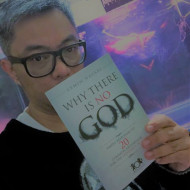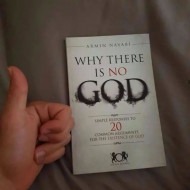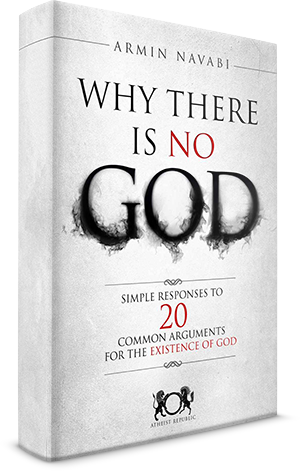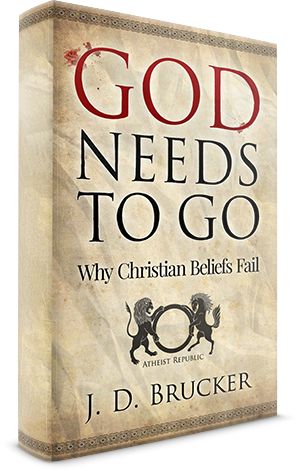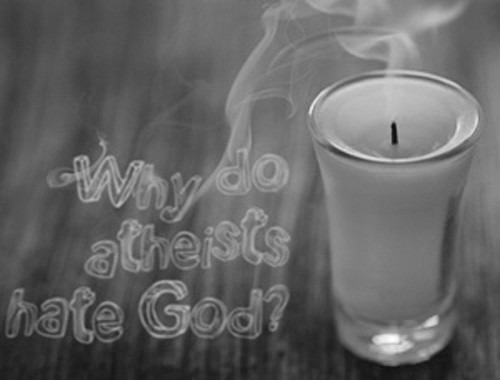
1) Atheists Believe Everything Came From Nothing
Many theists believe there was once nothing, and then there was something—the universe—created by their god. And so they ask, “But if there is no god then how can something come from nothing?”
This question has been asked for thousands of years, but now Quantum physics has provided a basis for some atheists, such as Lawrence Krauss, to indeed believe the universe comes from “nothing.” But Krauss doesn’t speak for all atheists and he speaks of a very different kind of “nothing,” the kind where virtual particles are created from borrowed energy inside a vacuum. This is not even remotely close to what theists mean by the term “nothing.”
When asked about the universe, most atheists simply stop somewhere along the lines of “the evidence suggests the universe began expanding approximately 13.77 billion years ago.” Beyond that I’m fine with “I don’t know.” I don’t need to know. I do not believe the universe came from “nothing” in the way theists use the word or in the way Krauss uses the word. I don‘t think there’s enough evidence to reach a conclusion yet and I‘m fine with that. I’ve never met an atheist who believed everything comes from “nothing“ in the way theists use the word and in my experience, only a minority subscribe to the theory Krauss puts forward. Theists may believe the universe sprang from nothing, but they then have the burden of proving there was ever “nothing” and that “something” requires any gods at all.
2) Atheists Have No Morals
Humans are social beings, and as such we have morals. Some theists say atheists have no reason to be moral since we don’t believe in a god to instruct or punish us. This claim seems rather disingenuous when one considers that most theists who say this wouldn’t become immoral deviants overnight if they suddenly stopped believing in a god.
Studies have shown our morals are a product of multiple factors. The Milgram experiment shows authority plays a major role. The Stanford prison experiment showed the same, but also displayed the role of social hierarchy. The “good or evil” puppet test for babies suggests we are all born with a basic sense of fairness, justice, and unfortunately, bigotry. Human morality is too complex to be explained by religion or lack of it.
Millions of atheists across the globe live moral lives every day. Some don’t. Neither do some believers. There are atheist charities and atheist criminals. There are religious charities and religious hate groups. Religious people and atheists can both behave morally or immorally because of—or wholly independent of—their religious beliefs. One doesn’t necessarily lead to the other. Studies have shown the basis of human morality is present even before we’re exposed to religion.
3) Atheists Have No Meaning of Life
Even if humanity survives the next 5 billion years on this planet, the sun will balloon into a red giant, boil and possibly devour the earth before exploding and blasting out through the cosmos. The universe will continue to expand at an increasing rate, and eventually the force of gravity will be too weak for any new stars or planets to form. The universe will whither and die.
Some theists consider this and think without belief in an afterlife, nothing really matters in this life. Believing in an afterlife can influence one’s meaning of life, but a meaning of life doesn’t require belief in an afterlife. Some theists refer to Nietzsche’s nihilism as if Nietzsche were the be-all and end-all of existentialist philosophy. But humans generally define our meaning in the moments we enjoy and the goals we set. This was probably best articulated by Albert Camus in The Myth of Sisyphus.
I enjoy every moment I spend with my daughter, and one of my goals is to be a good father. I enjoy art, and one of my goals is to read, hear and see more of it. I like a large, hot cup of coffee while watching the dim glow of morning just before dawn. I love the serenity of canoeing on a sunny day and the soft crunch of fresh snow beneath my feet. I enjoy my friends and my family. Atheism does give life meaning because as an atheist, I understand this is the only life I’ve got.
4) There Are No Atheists in Foxholes
Yes there are. They even have a website. Nonetheless there persists among some this belief that atheism is generally disingenuous and that everyone cries out to “God” in times of need. This claim highlights a conflicting epistemology between the theist who is basing beliefs in part on fear and need, and the those of us who determine beliefs based on facts and evidence.
Their assumption also implies that when a theist cries out “Oh God,” they are literally trying to talk to “God.” I have several religious family and friends who say “Oh God” in all sorts of scenarios but are rarely actually trying to carry on a conversation with The Almighty. Even a theist saying “Oh God” in a foxhole is most likely not actually expecting divine intervention. The phrase is generally used in the same way as “Oh Shit,” which generally doesn’t involve any reference to actual shit. Even so, there are millions of people who’ve encountered life threatening situations and didn’t cry out about god, shit or anything else.
5) Atheists Just Hate God
About as much as we hate unicorns. Theists tend to make this claim when atheists assert moral opinions about supposed deeds of their deity. “How can you have opinions about something you don’t believe in?” The same way we form opinions about Darth Vader, Willy Wonka or the Wicked Witch of the West—according to their role within the story. It doesn’t matter if the story involves a Sith killing all the Jedi kids or a god killing a nation’s first born.
Just repeating the claim back usually gets the point across. Do Christians “hate” Allah? Do Muslims “hate” Jesus? Do Jews “hate” the FSM? Not believing in a particular religion is not dependent on a negative opinion of that religion’s deity or messiah figure. It’s simply the result of not being convinced because the burden of proof has not been met. I personally think Buddha and Lao Tzu both had great things to say, but I’m not a Buddhist or a Taoist.
6) Atheists Just Don’t Want to Submit to God
Well, one would first need to provide reason for believing there is anything to submit to. Lacking belief in deities doesn’t mean one doesn’t want to submit to what they don’t believe in. Like number 5, the point can be made rather easily by simply repeating this back to the theist. Does the Christian lack belief in Allah just because she doesn’t want to wear a hijab? Do non Catholics lack belief in Catholicism simply because they don’t want to submit to the Pope? Do Muslims lack belief Jesus was the embodiment of “God” simply because they want to continue justifying child marriages with the actions of their so-called prophet?
7) Atheists Are Angry
There once was a time when challenging religion was considered taboo. Some would like to hold on to that standard to save their religion from scrutiny. Those days are over, but that doesn‘t mean being skeptical of religion means skeptics are angry.
Being confrontational does not equate to anger. If someone told you Elvis was spotted buying T-shirts at K-Mart, their claims would be analyzed, scrutinized, debunked and in most cases, outright laughed at. I see no reason why it should be any different for religious claims.
8) Atheists Are Responsible for the Worst Atrocities in History
Stalin, Pol Pot and Mao were all atheists, so atheism must be responsible for the mass executions during said reigns—or so the accusation goes. This statement is usually a retort to blaming Christianity for the Crusades or Islam for terrorism. The fact of the matter is there have been Christians, atheists, Muslims and many others of different beliefs and non beliefs who have committed multiple atrocities throughout history. But there have also been some of the kindest deeds in history performed by people of all kinds of belief and non belief.
Stalin, Pol Pot and Mao did not execute people in the name of atheism, but rather for simply not submitting to them as if they were gods themselves. There is a long list of atheist politicians who never committed atrocities. Claiming atheism would lead to disastrous atrocities like those witnessed in the early Soviet Union is a hasty generalization fallacy which ignores all the good deeds of decent atheist politicians throughout time.
9) Atheists Are Guilty of “Scientism”
It must be difficult holding beliefs which cannot be justified with evidence. This leads some theists to conclude atheists all subscribe to “scientism.” This term is meant as an insult against skeptics for daring to ask for evidence when confronted with extraordinary claims.
Scientism is a philosophy which holds that science is the ultimate truth, and that science is the only way to truth. But preferring science to superstition doesn’t mean science is always correct. Scientists are humans and can make mistakes like anyone else. However, the methodology of science does work. That doesn’t mean science is the only way to truth. It just means it’s an effective method of attaining natural truths.
Many atheists are equally skeptical of science and religion. My first assignment in my college statistics class was to find three examples of misused data in the media. This same task had been given to each class for over a decade and no two people ever turned in the same three examples. I have also studied philosophy, including philosophy of science, and so I understand science can be wrong. I have yet to meet an atheist who believes scientists are infallible.
10) Atheists Are All Rational and Logical
This is one I hear mostly from other atheists. Some atheists like to consider themselves more rational than theists and ask why we should call ourselves atheists at all, as opposed to calling ourselves rationalists or some other such term.
But all atheists are not rational. Atheism is simply the lack of belief in deities. There are atheists who believe in homeopathy, ancient aliens, 911 conspiracy theories and a host of other completely irrational ideas unsupported by any stretch of logic. Just because someone arrived at the rational non belief in deities does not mean they are rational about everything else.

